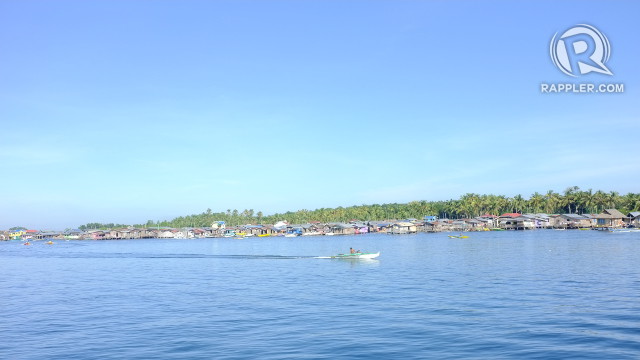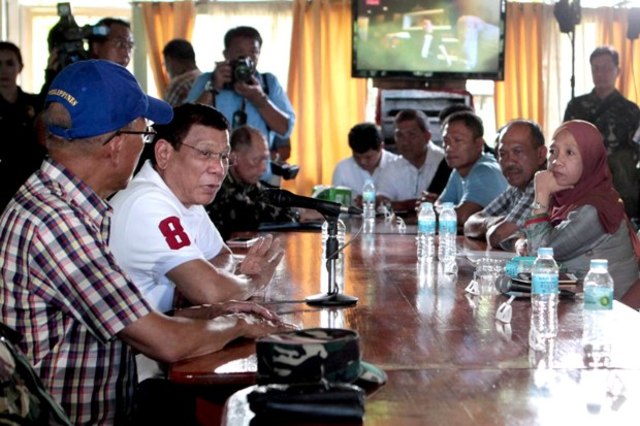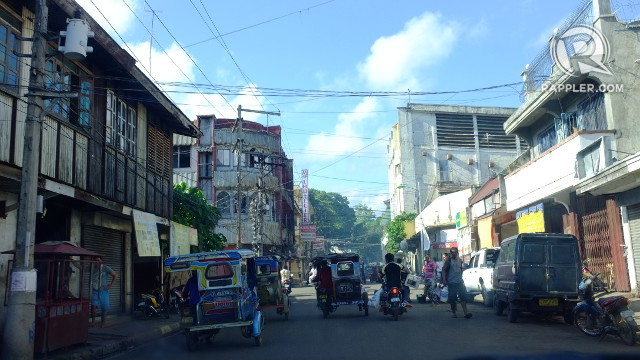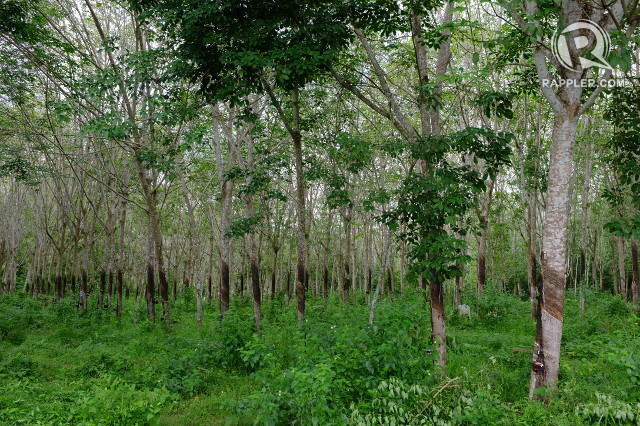The life and prosperity of residents in places like Basilan are at stake in the Duterte administration's efforts to destroy the Abu Sayyaf

WELCOME TO BASILAN. This view greets Basilan visitors who arrive in Isabela by boat. Photo by Pia Ranada/Rappler
In recent days, we’ve heard more aggressive rhetoric against the Abu Sayyaf from President Rodrigo Duterte.
After hearing about the beheading of a teenage hostage, he ordered the military to “destroy” the terrorist group. The military lost no time in complying with his order. Thousands of soldiers are being deployed to Sulu, bastion of the Abu Sayyaf.
Duterte’s visits to military camps in Basilan and Sulu, from where the group actively operates, allowed me to peek into what it’s like to live under their shadow.
Though stringent security measures surrounding a presidential coverage and time constraints allowed me only limited exposure to these places and the people who live there, I was able to ask the vice mayor of the Basilan city of Lamitan how things are in his hometown.
Lamitan is a 5th class city deemed a “hub” in Basilan because those from the southern towns pass through it to get to the port city of Isabela, Lamitan Vice Mayor Roderick Furigay told me in late July.
The city of around 74,000 residents is described as “generally peaceful” by Furigay, whose wife, Rosita, is the current mayor.
But military operations against the Abu Sayyaf in the southern, more mountainous parts of Basilan have forced some residents there to move to Lamitan.

PRESIDENT IN BASILAN. President Rodrigo Duterte holds a meeting with local officials at the 104th Brigade Camp in Isabela City, Basilan on July 21. Photo by Robinson Ninal/PPD
Urban terrorist groups
Though Lamitan fares better compared to towns like Al Barka, where encounters between the Abu Sayyaf and military forces often take place, its residents continue to live in fear of the group’s deployment of urban terrorist groups (UTGs).
Vice Mayor Furigay said the UTG is a smaller group “created” by the Abu Sayyaf to extort Lamitan residents through terror attacks in parts of the city.
The Abu Sayyaf needs the UTG to do the dirty work so it can avoid getting caught by the military and police who know their faces.
“Karamihan sa kanila (Abu Sayyaf) hindi na bumababa dito (Most of the Abu Sayyaf don’t come down here), because they are known,” Furigay said.

URBAN BASILAN. Just like any other province, Basilan hopes for prosperity and development. Photo by Pia Ranada/Rappler
He described UTG members as young people ordered by the Abu Sayyaf or ASG to plant bombs in vital places in the metro to extort money from people like businessmen or residents.
“Mga bago, mga teenagers na ito and they are the ones doing the, naglalagay ng bomba. Parang utos ‘yun galing ng ASG to the UTG,” said Furigay. (They are new, teenagers who are the ones planting the bombs. The orders appear to come from the ASG to the UTG.)
In one incident, the UTG placed a bomb near an electric post of the Basilan Electric Company. They called the company and threatened to blow up the post if they are not given money.
The UTG would then just dial a number to detonate the bomb.
“This year alone, bale siguro 7 or 8 bombs na pumutok dito (some 7 or 8 bombs have already exploded here),” said Furigay.
Major Filemon Tan, spokesman of the military's Western Mindanao Command, said military intelligence shows these UTGs may indeed be part of the ASG or receive orders from the ASG.
The monetary “rewards” the UTG and ASG gain from these criminal activities far outweigh any vestige of religious principle they claim to espouse in their war against the Philippine government, said the vice mayor.
“They are for extortion, they no longer use their principles as their motivation,” he said.
Deploying drug addicts
Lamitan’s experience with the Abu Sayyaf also shows how closely entwined terrorism is with the illegal drug trade.
Furigay said the ASG often deploy drug addicts for acts of urban terrorism.
“They will hire these addicts para magdala ng bomba dito sa loob. Babayaran sila ng P3,000, P5,000, mga user 'yan eh,” he said. (They will hire these addicts to bring bombs here. They will pay them P3,000 or P5,000 because they are drug users.)
Aside from exploiting the addicts’ need for money to fuel their addiction, the terrorist group takes advantage of their state of mind as well.
“They use addicts because no one else has the confidence to bring bombs here unless they are high. That’s their modus,” said Furigay in a mix of English and Filipino.
The so-called terrorism and drug trade nexus is a phenomenon long observed by law enforcement agencies.
According to the Serious and Organized Crime Threat Assessments (SOCTA) 2014, a study on anti-crime efforts by Philippine government agencies, the Abu Sayyaf sources some of its funds from the illegal drug trade.
For this reason, Furigay is thankful for the two wars Duterte is waging: one against drugs, the other against the Abu Sayyaf.
He said over 2,000 drug addicts in Lamitan have surrendered to the local government.
He is hoping these professed addicts can soon enter the workforce given Lamitan’s need for more workers, which they presently fill by hiring people from Zamboanga City and surrounding towns.
Rehabilitation
The rising number of surrenderees has convinced Furigay and the mayor to talk to the Basilan provincial government about putting up at least one rehabilitation center in Basilan.
Furigay supports Duterte’s orders for an all-out war against the Abu Sayyaf. In his view, heightened military action against the group is the “ultimate solution” to the peace and order problems of his province.
“Ang gusto namin matapos lang itong gulo. Ibig kong sabihin, huwag na ihinto ‘yung operation, let us continue the operation. Ang gusto ko, kung operation man, operation na talaga – 'yan ang ultimate solution diyan,” he said. (What we want is for the chaos to end. What I mean is, don’t stop the operation [against Abu Sayyaf], let us continue the operation. What I want is, if there’s an operation, it should be a real operation – that’s the ultimate solution.)
The reality on the ground is that in places like Basilan, local governments and civilians have only law enforcers to turn to against groups that sow terror.
“We cannot rely sa ibang tao except for the PNP [Philippine National Police] and military. Sila lang ang may armas. Nakikita mo ang civilian dito, iilan lang kami,” he said. (We cannot rely on other people except for the PNP and the military. Only they are armed. You can see the number of civilians here, we are not that many.)
New Basilan
A new Basilan is rising. The Basilan I was able to visit is different from the Basilan of years ago, insisted Furigay.
He boasted of the new roads linking major towns and cities that have drastically reduced travel time and improved the lives of residents.
Villages that had once taken many hours to get to can now be reached in 20 or 30 minutes because of new concrete roads. Vegetables and fruits that would rot by the time farmers reached the town markets now arrive fresh.
The towns of Basilan are now faced with the happy problem of traffic in main thoroughfares.
“May mga kotse na nga. May kotse na Muslim brothers natin. Talagang kung titingnan mo in a macro persective 'yung Basilan, umaasenso na kami but because of itong mga grupo, eh napu-pull down,” said Furigay. (There are cars already. Our Muslim brothers have cars. If you look at Basilan on a macro perspective, we are progressing but because of these groups, we are being pulled down.)

NEW LEAF. Rubber, among the chief products of Basilan, is collected from these rubber tree plantations found beside major roads. Photo by Pia Ranada/Rappler
I myself had the chance to marvel at Basilan’s new roads as my vehicle whizzed through orderly rubber tree plantations and views of forested mountains stretching into a sun-blazed horizon.
We residents of Metro Manila and places in other parts of the Philippines may only read about the Abu Sayyaf in headlines but those living in Basilan, Sulu, and other parts of Mindanao live in fear of the group every day.
Duterte’s promise to eradicate the Abu Sayyaf means everything to them.
Will Duterte’s fights against drugs and terrorism clear the way for life and prosperity in these places?

No comments:
Post a Comment
Note: Only a member of this blog may post a comment.